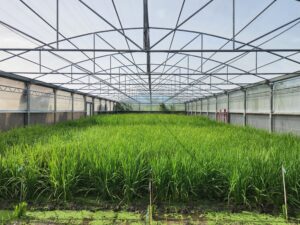The pioneering work being done at the International Rice Research Institute (IRRI) to transform rice, a C3 plant, into a C4 plant (like maize and sorghum) that uses sunshine more efficiently has made it to the MIT Technology Review’s prestigious 10 Breakthrough Technologies list for 2015.
The Breakthroughs list identifies 10 milestones from the past year “that solve difficult problems or create powerful new ways of using technology” and that will matter for a long time to come.
The C4 Rice Project is a consortium of research institutions, led by IRRI, that implements ‘frontier’ research that seeks to find a new way to radically increase rice yields, anticipating continued rise in global food needs decades into the future.
From the same amount of sunlight, plants that use C4 photosynthesis produce more food mass in its grains overall compared to C3 plants. If this trait can be bred into the rice plant, it could mean up to 50% more grain yield from current global levels. This is the big vision of the project, which is funded by the Bill & Melinda Gates Foundation.
“This is an important recognition of the work of the C4 Rice Consortium, and further inspires all the efforts being made to realize this vision,” said Paul Quick, IRRI scientist and leader of the C4 Rice Project.
The story on C4 rice research, titled “Supercharged Photosynthesis,” goes online and can be accessed here on February 18. The print version hits newsstands on March 3.
Learn more about IRRI (www.irri.org) or follow us on the social media and networks (all links down the right column).









